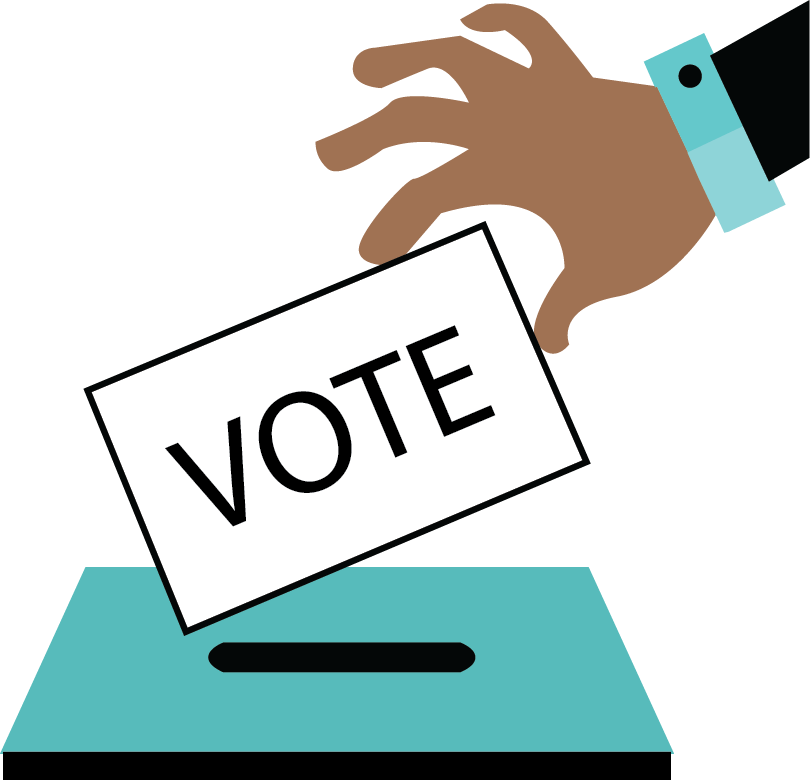
Graphic by Devan Feeney
vote
This Friday is the last day to register to vote for the North Carolina presidential primaries on March 15. The primaries are when people vote for the candidates they want to represent their political party in the general election in November.
Many college students have questions about the primaries, such as how to register to vote and where to vote. These questions are particularly important to students, as many students live far from places they grew up, which can affect their ability to vote.
Anyone can check their voter registration online at the North Carolina Board of Elections website on the public voter search page. Information about a voter’s registration status, address of registration, polling location and party affiliation can be found through searching on that website.
For students wanting to register to vote, change party affiliation or change a place of residence to Wake County, the state requires voters to fill out a voter registration form, which can be printed off of the Board of Elections’ website, and have it postmarked to the Wake County Board of Elections by this Friday. If it is not postmarked by that date, the state will not accept the registration form.
The mailing address for the Wake County Board of Elections is PO Box 695, Raleigh, NC 27602. None of these voter services are currently available online and must be done by mail.
Once registering is out of the way, there are three different ways to cast a vote in North Carolina: early voting or one-stop voting, absentee voting and regular election-day voting.
For early or one-stop voting, there are nine different polling places in Wake County. Anyone registered to vote in Wake County may cast a ballot at any of these locations, regardless of their residential address. Early voting begins on March 3 and will be open until March 12. At these locations, voters are free to drop by any time the locations are open and fill out a ballot.
If students living in Wake County temporarily don’t want to change their legal addresses to their campus homes, they must fill out an absentee ballot and send it by mail to the Board of Elections in their home towns by March 15, so long as they are currently registered to vote in that county. The absentee form can be printed from the State Board of Elections’ website. This cannot be done online and must be done by mail.
Isaac Tolbert, a freshman studying first-year engineering, said he is counting on absentee voting because he doesn’t want to give up his connection to his home county in order to vote at school.
“I was born and raised in Caldwell County, and I want my vote to be representative of that,” Tolbert said. “I haven’t lived in Wake County long, so I don’t know if I feel right voting in a place I’ve spent so little time in.”
Students wishing to vote on Election Day can look up their polling locations on the North Carolina Public Voter Search. Polls open at 6:30 a.m. and close at 7:30 p.m. On this day, voters must report to their specific polling location assigned to them from their home county.
Jacob Dremann, a freshman studying first-year engineering, said he took the necessary steps to ensure he can exercise his right to vote in March.
“I changed my address to Raleigh to make it easier to vote and ensure that my vote would be cast,” Dremann said.
North Carolina recently implemented a new voter ID law, which requires voters to be prepared to present a government-issued ID card such as a passport, driver’s license, a state-issued ID or a military ID. Student ID cards are not a valid form of ID, and students wishing to vote without an accepted form of identification must get one before Election Day if they wish to cast a ballot.
Voting in the primaries is different than other elections, as it involves a system of delegates similar to how the president is elected by the Electoral College in November.
Voting in the presidential primaries goes toward appointing delegates who represent voters of an individual party. Individual states have a certain number of delegates that candidates want to win, and the winner is determined by how many delegates he or she has.
North Carolina has 121 democratic delegates and 72 republican delegates at stake. Each candidate’s goal is to win as many delegates in his or her party as possible.
Votes cast in the primaries lead to the number of appointed delegates of a specific party. The more popular votes cast for a candidate equals more delegates appointed for that candidate.
In the United States, there are three types of presidential primaries: open, closed and mixed. Each state chooses which system it wants to use. Open primaries mean any member of any party can vote in either the Republican or Democratic primaries. In closed primaries, only registered members of a certain party can vote in that party’s primary.
North Carolina has a mixed primary, which means that Republicans and Democrats must vote in their respective primary, but unaffiliated voters can vote in either the Republican or Democratic primary.